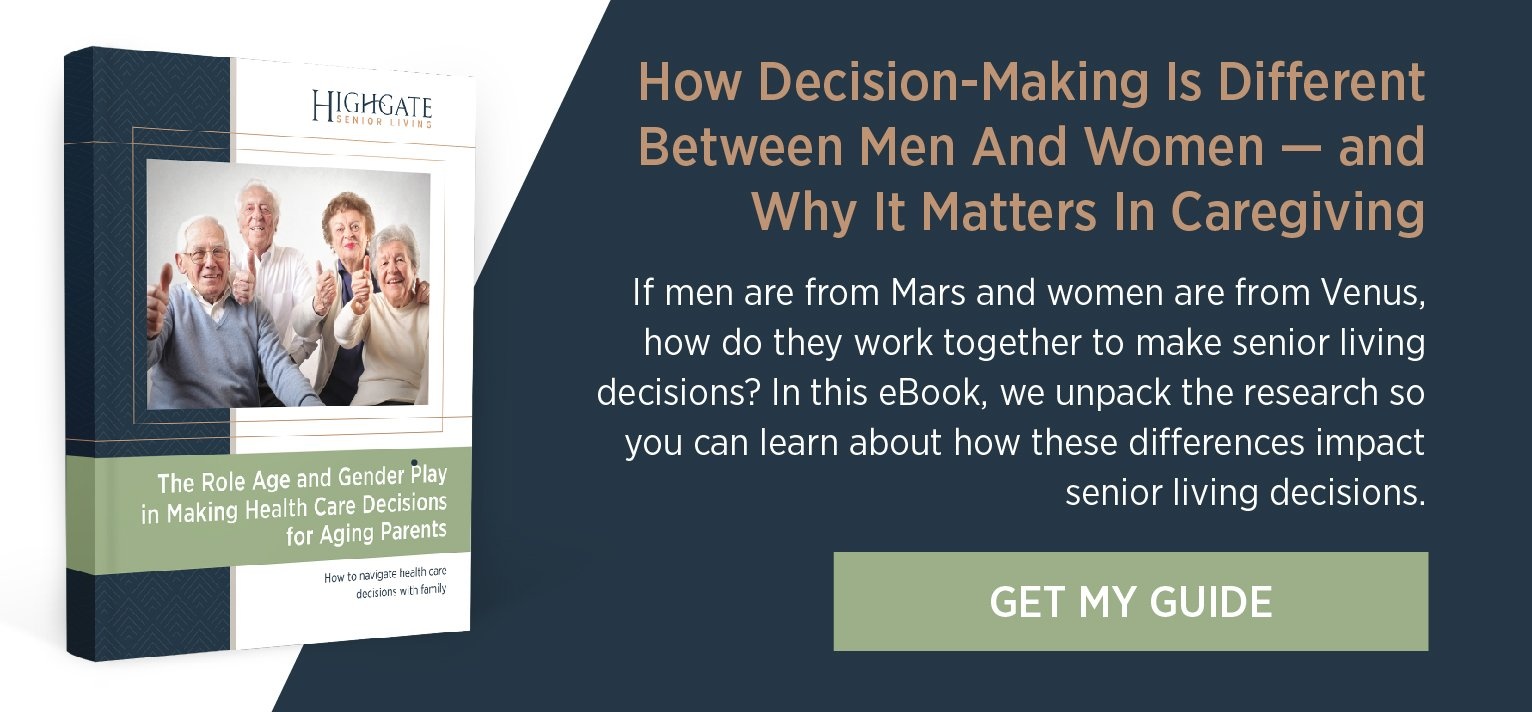
Although many older adults prefer to stay at home as long as possible, various studies have reported gender does influence this choice. Turns out moving Mom might be a lot different than moving Dad.
Gender Differences in Opinions on Senior Living
According to research, men are more likely to expect care from relatives in their home or in their relatives’ home, which may be due, in part, to the fact that women are statistically more committed to spouse caregiving than men and believe in traditional gender roles.
When it comes to baby boomers, research shows that women are more likely to expect to live in a long-term care setting (such as independent or assisted living or even a nursing home) due to longer life expectancy and more frequent widowhood.
For some families, this may mean that women of baby-boomer age are more accepting of considering long-term care settings than a parent or a male sibling.
Although health care concerns often become the focus of long-term care discussions among family members, it’s important to remember that physical health is only one aspect of overall well-being. According to the World Health Organization’s declaration signed in 1946 by 61 nations: “Health is a state of complete physical, mental, and social well-being and not merely the absence of disease or infirmity.”
Women suffer more than men from loneliness and depression; however, isolation and limited interaction with others will have a negative effect on anyone — regardless of gender.
Because men tend to be more task-oriented, this may mean that women see the benefits of socialization in a community setting more clearly. Although your dad may be able to still manage his medications on his own, he might not clearly understand the effect living alone can have on his overall health and well-being.
Understanding how men and women view the possibility of the need for long-term care can have a significant impact on how you approach the conversation.
How to Apply to Senior Living Decisions
1. Be aware of these tendencies.
Men and women may have different expectations of their spouse, and what that means for caregiving as one spouse needs more support. For example, if you know that your father expects your mother or a daughter to care for him as he ages, you’ll be less likely to assume he’s just “being difficult” or even fickle. Have conversations that set realistic expectations and discuss a plan for the future should caregiving be too difficult for just one person to handle.
2. Focus on overall well-being, not just physical health
Discussing long-term care decisions is rarely easy. Understanding that overall well-being — happiness, not just good health — is the goal is important for helping a parent understand the benefits of making a change. Remember that older adults are typically risk-averse and the thought of such a big change can be quite scary.
3. Listen with genuine curiosity.
Understanding differences in how each person in your family makes decisions is the key to working out any differences you may have. By knowing that women and men sometimes see things through different filters, you can begin to share with one another the distortions you experience and find your way to clarity.
Why does Dad expect you to care for him, and how does he see that changing your relationship?
Why does your mom feel it is best to stay at home to care for your dad, and what kind of an effect has this had on her health and well-being?
Sometimes the best conversations are had by starting with curious questions to understand why a loved one feels the way they do.
How to Navigate Health Care Decisions with Family
Whether you’re deciding to buy a house with an in-law suite or to move Mom, Dad, or a spouse into a senior living community, understanding these gender differences can help you understand why your brother might all of a sudden want to be very hands-on with care decisions about your mom or why your father might ask you to give him one more year living at home.
Just like family dynamics and gender differences can play a role in how a family approaches decisions, so can age differences.
To learn more, download our eBook The Role Age and Gender Play in Making Health Care Decisions for Aging Parent.






